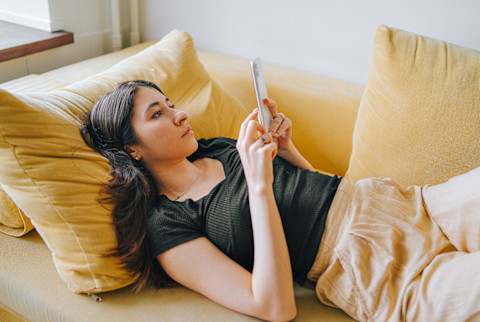This Wild 2020 Has Changed Our Social Media Habits, Research Finds

Browsing social media feels a little different these days. Next to the photos of our friends' cute kids are heated debates about masks and COVID-19 safety protocols, stories of racial injustice and violence against Black Americans, and other difficult conversations.
With everything that's been going on, many people seem to be adjusting their social media habits, according to new research from the Ohio State University Wexner Medical Center.
Needing a break from social media.
A survey of 2,000 people showed many Americans are taking a break from social media—while others are finding themselves even more glued to it.
In total, 56% of Americans say their social media habits have changed specifically because of what's been going on in 2020. Some 20% of Americans have specifically taken breaks from social media due to stressful current events this year.
"Stepping away and reconnecting with reality offline is an important step to take for your mental health," Ken Yeager, Ph.D., LISW, a psychiatrist and clinical director at the center, said in a news release. "Being constantly immersed in this stressful environment and being overexposed to contentious or traumatic events can make you feel like the world is a less safe place to be. And because these stressors have persisted over a long period of time, it's wearing on people's ability to cope with that stress."
The rise of doomscrolling.
Meanwhile, 29% of Americans have increased their time on social media because of these same events. This aligns with the trend of "doomscrolling" that's been observed amid COVID-19, wherein people feel the need to keep refreshing their social feeds to stay informed and find themselves sucked into consuming stressful information for hours on end.
The problem is that staying consistently immersed in conversations that keep your stress levels at their peak is neither good for your long-term well-being nor a sustainable strategy for creating social change.
"The kind of graphic violence shown on social media can elicit trauma," psychoanalyst Babita Spinelli, L.P., recently told mbg. "This can be detrimental to mental health if it continues to be the fabric of one's day."
Finding a healthy balance.
The trends observed in this study all point to the same truth: The events of this year have been incredibly stressful and overwhelming, and social media has become a place where we're constantly confronting these issues, meaning some changes to our habits have become necessary for our mental health.
We do need to stay informed about public health information and stay active in the fight for racial justice. We also need time to rest, recharge, and not be inundated with negativity every minute.
Find a way to approach news consumption that keeps you connected to the issues that matter while also prioritizing the self-care that will allow you to keep fighting.
